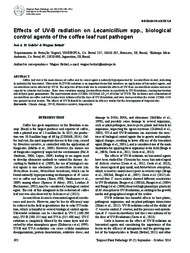Effects of UV-B radiation on Lecanicillium spp., biological control agents of the coffee leaf rust pathogen.
Effects of UV-B radiation on Lecanicillium spp., biological control agents of the coffee leaf rust pathogen.
Author(s): GALVAO, J. A. H.; BETTIOL, W.
Summary: Coffee leaf rust is the main disease of coffee and its causal agent is naturally hyperparasited by Lecanicillium lecanii, indicating its potential for biocontrol. Ultraviolet-B (UV-B) radiation is an important factor that interferes on application of biocontrol agents, and Lecanicillium can be affected by UV-B. The objective of this work was to evaluate the effects of UV-B on Lecanicillium isolates and on its capacity to colonize rust lesions. There were variations among Lecanicillium strains in sensitivity to UV-B radiation, causing inactivation and delayed spore germination. The most tolerant strain (CCMA-1143) had LD50=1.63 kJ/m2 of UV-B. The incidence and colonization of Lecanicillium on coffee leaf rust lesions were influenced by the dose of UV-B radiation, and were increased when the isolate CCMA-1143 was sprayed on rust lesions. The effects of UV-B should be considered on efficacy studies for the development of biopesticides.
Publication year: 2014
Types of publication: Journal article
Unit: Embrapa Environment
Observation
Some of Embrapa's publications are published as ePub files. To read them, use or download one of the following free software options to your computer or mobile device. Android: Google Play Books; IOS: iBooks; Windows and Linux: Calibre.
Access other publications
Access the Agricultural Research Database (BDPA) to consult Embrapa's full library collection and records.
Visit Embrapa Bookstore to purchase books and other publications sold by Embrapa.

